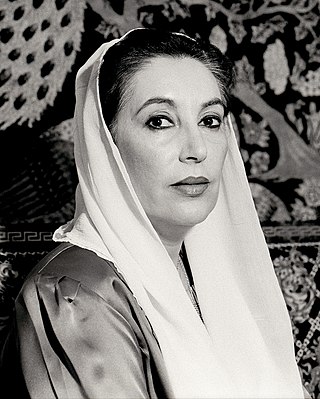
Benazir Bhutto was a Pakistani politician who served as the 11th and 13th prime minister of Pakistan from 1988 to 1990 and again from 1993 to 1996. She was the first woman elected to head a democratic government in a Muslim-majority country. Ideologically a liberal and a secularist, she chaired or co-chaired the Pakistan Peoples Party (PPP) from the early 1980s until her assassination in 2007.
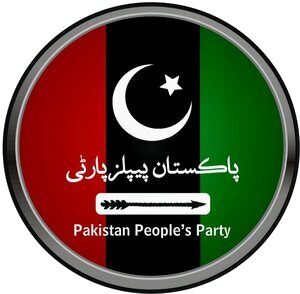
The Pakistan People's Party is a centre-left, social-democratic political party in Pakistan. It is currently the third largest party in the National Assembly and second largest in the Senate of Pakistan. The party was founded in 1967 in Lahore, when a number of prominent left-wing politicians in the country joined hands against the military dictatorship of President Ayub Khan, under the leadership of Zulfikar Ali Bhutto. Affiliated with Socialist International, the PPP's platform has formerly been socialist, and its stated priorities continue to include transforming Pakistan into a social-democratic state, promoting secular and egalitarian values, establishing social justice, and maintaining a strong military. The party, alongside the Pakistan Muslim League-Nawaz and the Pakistan Tehreek-e-Insaf, is one of the 3 largest political parties of Pakistan.

Qaumi Watan Party, abbreviated as QWP and formerly called Pakistan Peoples Party–Sherpao (PPP–S), is one of the prominent political parties in Pakistan, that split away from the Pakistan Peoples Party just before the 2002 general election. PPP–S was named after its leader Aftab Ahmad Sherpao. Differences had cropped up between PPP Chairperson Benazir Bhutto and Senior Leader Aftab Ahmad Sherpao in 1999 and the latter was expelled from the PPP by the former, thus creating PPP–S. In October 2012, it was renamed to Qaumi Watan Party when it changed its political agenda and declared itself as a Pashtun neo-nationalist party.
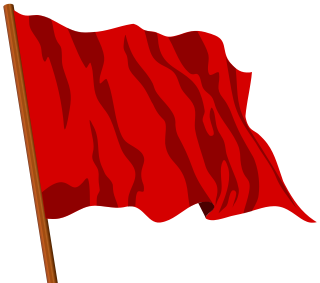
The Wali Khan faction of the National Awami Party was formed after the 1967 split in the original NAP between Maulana Bhashani and Abdul Wali Khan. The Wali Khan faction was later named National Awami Party (NAP) after the independence of Bangladesh.

Aftab Ahmad Khan Sherpao is a Pakistani politician who is the current chairman of the centre-left Pashtun nationalist Qaumi Watan Party, after previously being a member of the Pakistan Peoples Party. He was a member of the National Assembly of Pakistan from November 2002 to May 2018.
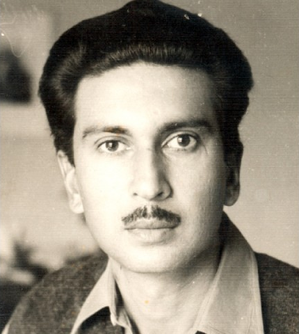
Hayat Mohammad Khan Sherpao, simply known as Hayat Sherpao, was a left-wing intellectual and socialist, serving as the 15th Governor of North West Frontier Province of Pakistan, as well as vice-chairman of Pakistan People's Party. Sherpao held important executive offices, including served as the Interior minister and had held a number of provincial ministries of the North West Frontier Province. He was assassinated in 1975, and his death was blamed on a rival political party in the province - the Awami National Party of Khan Abdul Wali Khan.
The Sherpao family is a cadet branch of the Kheshgi family.

Nasrullah Khan Khattak was a Pakistani politician, who was the 6th elected Chief Minister of Khyber-Pakhtunkhwa and served from 3 May 1975 to 19 April 1977.
Masood Kausar is a Pakistani politician who was 28th Governor of Khyber Pakhtunkhwa. He held many senior government positions including; Speaker of the Assembly, Minister for Communications, Deputy Leader of Opposition in Khyber Pakhtunkhwa province and Chairman of standing committee while he was Member of the Senate of Pakistan. He is one of the founding members of the Pakistan Peoples Party (PPP).

The assassination of Benazir Bhutto took place on 27 December 2007 in Rawalpindi, Pakistan. Benazir Bhutto, twice Prime Minister of Pakistan and then-leader of the opposition Pakistan People's Party, which had been campaigning ahead of elections scheduled for January 2008. Shots were fired at her after a political rally at Liaqat National Bagh, and a suicide bomb was detonated immediately following the shooting. She was declared dead at 18:16 local time, at Rawalpindi General Hospital. Twenty-three other people were killed by the bombing. Bhutto had previously survived a similar attempt on her life that killed at least 180 people, after her return from exile two months earlier. Following the tragic event, Election Commission of Pakistan postponed the general elections by a month, which saw Bhutto's party win.

Bilawal Bhutto Zardari is a Pakistani politician who is serving as the 37th Minister of Foreign Affairs, in office since 27 April 2022. He became the chairman of Pakistan People's Party, in 2007 following his mother's assassination. He belongs from the Bhutto family, a prominent political family of Pakistan. He is the son of former Prime Minister Benazir Bhutto and former President Asif Ali Zardari. Bilawal became a member of the National Assembly of Pakistan on 13 August 2018.

An indirect presidential election was held on 6 September 2008 in Pakistan. The Electoral College of Pakistan – a joint sitting of the Senate, National Assembly and Provincial Assemblies – elected a new president after the resignation of President Pervez Musharraf. As required by the constitution, Muhammad Mian Soomro automatically became acting president on 18 August 2008, upon the resignation of Musharraf. The constitution required that a new president be elected by Parliament within 30 days; Soomro was considered loyal to Musharraf, and it was considered certain that he would be replaced in that election.

General elections were held in Pakistan on 3 February 1997 to elect the members of National Assembly. The elections were a fierce contest between Pakistan Peoples Party (PPP) led by pre-election Prime Minister Benazir Bhutto and the Pakistan Muslim League (N) led by Nawaz Sharif. Unlike the 1990 elections where Sharif won due to allegations of rigging, this time he benefited from the controversial death of Bhutto's brother Murtaza, a populist leader, a worsening economy, and alleged corruption cases against Bhutto's husband Asif Ali Zardari.

General elections were held in Pakistan on 24 October 1990 to elect the members of the National Assembly. The elections were primarily a contest between the People's Democratic Alliance and the conservative nine-party alliance, Islami Jamhoori Ittehad (IJI) headed by Nawaz Sharif.
Sardar Muhammad Aslam Advocate was member of the upper house of parliament of Pakistan. He was twice elected as senator on the Pakistan Peoples Party ticket. He was also member of Pakistan Peoples Party central executive committee and President Pakistan Peoples Party Hazara division from 1967 to 1977. He was also a three-time president of the District Bar Association Abbottabad.

The Pakistan Peoples Party (Sindhi: پيپلزپارٽي شهيدڀٽو) is a political party in Pakistan and one of three breakaway factions of the old Pakistan Peoples Party. The party is currently headed by Ghinwa Bhutto, the widow of Murtaza Bhutto.

Khan Amirzadah Khan was a member of the Khudai Khidmatgar movement and a leader of the National Awami Party in Pakistan. Born in Bakhshali village, Mardan District in the province of Khyber Pakhtunkhwa, he was an active participant of Khudai Khidmatgar movement organized by Bacha Khan. Amirzada Khan started active politics with National Awami Party and remained President of National Awami Party District Mardan until 1972, when he remained senior Provincial Minister of Law, Education and Parliamentary Affairs.
Barrister Iftikhar Ahmad is a Pakistani barrister, political activist and former military officer. He served in the Pakistan army between 1968-78. He fought in East Pakistan in 1971 and was a PoW in India. After the 1977 military coup, he resigned from the army, as a serving Major, in protest against General Zia's Martial Law. He began a period of exile in London and became a close associate of Mir Murtaza and Shah Nawaz Bhutto in the struggle against dictatorship, having joined the Pakistan Peoples Party in 1979. He later became a close aide to Benazir Bhutto and returned to Pakistan during Zia's rule, only to be jailed and tried in a court martial. After a successful appeal against a death sentence, he was released and became a prominent & respected PPP figure, serving as Advisor to the Chief Minister Khyber Pakhtoonkhwa, and later, as a Member of the Senate of Pakistan. He also held several party offices including President PPP (Overseas), Deputy Information Secretary PPP and was a member of the Central Executive Committee of the party. He parted ways with PPP on a matter of principle when Aftab Sherpao was ousted from the party. As a Barrister, he has been involved in prominent international legal cases and represented the State of Pakistan.
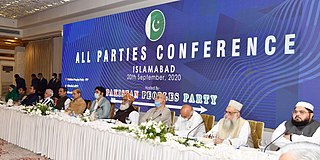
The Pakistan Democratic Movement, or PDM, is a coalition of political parties in Pakistan. It was founded in September 2020 as a movement against then prime minister Imran Khan, accusing his regime of poor governance, political victimisation of opponents, and mismanaging the economy and foreign policy. The struggle was also joined by several dissident members of Khan's own party, Pakistan Tehreek-e-Insaf (PTI). On 10 April 2022, the coalition succeeded to oust Khan through a no-confidence motion, after which the PDM formed its own government, choosing the opposition leader Shehbaz Sharif as the country's prime minister.














